
Ecological Solutions and Evidence
Scope & Guideline
Championing global discourse for environmental solutions.
Introduction
Aims and Scopes
- Ecological Restoration and Management:
The journal emphasizes studies that explore methods for restoring ecosystems and managing natural resources sustainably, including reforestation, habitat restoration, and the management of invasive species. - Biodiversity Conservation:
Research focusing on the conservation of biodiversity, including species recovery programs, habitat protection, and the impacts of human activities on wildlife populations. - Community Engagement and Citizen Science:
The journal highlights the importance of involving local communities and citizen scientists in ecological research and conservation efforts, fostering collaborative approaches to environmental management. - Climate Change Impacts:
Papers addressing the effects of climate change on ecosystems, species distributions, and conservation strategies are a core focus, providing insights into adaptive management techniques. - Technological Innovations in Ecology:
The use of technology, such as remote sensing, drones, and eDNA analysis, to monitor ecosystems and biodiversity is a significant area of interest, showcasing advancements that improve ecological research. - Sustainable Agriculture and Land Use:
Research that examines the interactions between agriculture and ecology, focusing on sustainable practices that enhance biodiversity while maintaining agricultural productivity.
Trending and Emerging
- Integrative Approaches to Conservation:
There is a growing trend towards research that integrates multiple disciplines, including social sciences, to address complex conservation issues and enhance stakeholder engagement. - Ecosystem Services and Natural Capital:
An increasing number of studies are focusing on the valuation of ecosystem services and natural capital, emphasizing their importance for sustainable management and policy-making. - Climate Resilience and Adaptation Strategies:
Research exploring adaptive management strategies to enhance ecosystem resilience in the face of climate change is gaining traction, reflecting urgent needs for effective responses. - Use of Environmental DNA (eDNA):
The application of eDNA technology for biodiversity monitoring is a rapidly emerging theme, offering innovative ways to assess species presence and ecosystem health. - Collaborative Research Models:
The trend towards collaborative models involving diverse stakeholders, including Indigenous communities, is becoming more prominent, highlighting the importance of co-management in ecological research. - Urban Ecology and Green Infrastructure:
As urbanization continues to rise, research focusing on urban ecology, green infrastructure, and the role of urban green spaces in biodiversity conservation is increasingly prevalent.
Declining or Waning
- Traditional Ecological Knowledge:
There has been a noticeable decrease in the emphasis on incorporating traditional ecological knowledge in ecological studies, possibly overshadowed by more contemporary scientific approaches. - Purely Theoretical Research:
Studies that focus solely on theoretical frameworks without practical application or evidence-based solutions appear to be less frequent, indicating a shift towards more applied research. - General Biodiversity Surveys:
General surveys of biodiversity without a specific management or conservation angle are becoming less common, as the journal increasingly favors studies that connect biodiversity data to actionable solutions. - Single-Species Focus:
Research centered exclusively on single species, without consideration of ecosystem interactions or broader ecological contexts, is declining in favor of more integrative and holistic approaches. - Historical Ecology:
The focus on historical ecology, which examines past ecosystems and their dynamics, has diminished, with more attention being paid to current ecological challenges and their solutions.
Similar Journals

Global Ecology and Conservation
Leading the way in ecology and conservation science.Global Ecology and Conservation, published by Elsevier, stands as a premier open-access journal dedicated to advancing the field of ecology and conservation science. Since its inception in 2014, the journal has facilitated the dissemination of high-quality research, fostering critical dialogue on ecosystem management, biodiversity preservation, and sustainability practices across the globe. With a remarkable ranking within the top quartiles (Q1) in various categories including Ecology, Evolution, Behavior and Systematics, and Nature and Landscape Conservation, it is positioned among the leading resources for researchers and professionals alike. The journal has garnered a notable impact, ranking #65 out of 721 in Ecology, and houses articles that are vital to understanding and addressing the pressing environmental challenges of our time. Available in an open-access format, researchers can freely access and share vital findings, promoting a collaborative approach to ecological research. Global Ecology and Conservation is not just a publication; it is a critical tool for innovation and advocacy in conservation, poised to inspire the next generation of environmental stewards.

PACIFIC CONSERVATION BIOLOGY
Empowering conservation through rigorous research and collaboration.PACIFIC CONSERVATION BIOLOGY is an esteemed academic journal published by CSIRO PUBLISHING, dedicated to advancing research in the fields of ecology and nature conservation. With a strong focus on the unique challenges and biodiversity of the Pacific region, this journal serves as a crucial platform for researchers, conservationists, and students alike to disseminate high-quality, impactful findings. Operating from Australia, it has become a significant resource since its inception in 1993, navigating through nearly three decades of vital scholarly communication. Ranked in the Q2 category for both Ecology and Nature and Landscape Conservation as of 2023, PACIFIC CONSERVATION BIOLOGY maintains rigorous standards, as reflected in its successful Scopus rankings. The journal plays a pivotal role in addressing pressing ecological issues and fostering innovative conservation strategies, making it an essential reference for anyone involved in environmental science. Access options for the journal facilitate widespread distribution of knowledge, supporting the mission to promote informed decision-making in conservation practices.
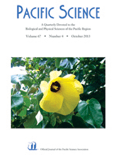
PACIFIC SCIENCE
Charting New Territories in Pacific SciencePACIFIC SCIENCE is a prestigious multidisciplinary journal published by University of Hawaii Press, dedicated to advancing knowledge across diverse fields of study related to the Pacific region. With a robust ISSN of 0030-8870 and an E-ISSN of 1534-6188, this journal serves as a vital platform for researchers, professionals, and students to disseminate and access influential research findings that contribute to the understanding of ecological, cultural, and social dynamics in the Pacific. The journal has steadily maintained its relevance since its inception in 1947 and features a commendable Scopus Rank of #74 out of 171 in the multidisciplinarity category, placing it in the 57th percentile of its field, and is recognized as having a Q2 quartile ranking in 2023. Although lacking open access options, PACIFIC SCIENCE offers in-depth analysis and scholarly discourse, effectively bridging various disciplines to foster collaboration and innovation. With its commitment to high-quality research and its significant impact on Pacific studies, the journal continues to play an important role in informing policy, conservation efforts, and community engagement within this vital region.
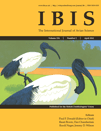
IBIS
Illuminating the path for ecological understanding.IBIS, published by WILEY, stands as a prestigious journal in the field of animal science, zoology, and ecology since its inception in 1859. With a focus on innovative research that informs the scientific community on ecological dynamics, behavioral studies, and conservation strategies, IBIS fills a critical niche for researchers, professionals, and students alike. The journal is recognized for its robust impact factor and commands a Q1 ranking in three key categories as of 2023, demonstrating its influence and reach within the global academic landscape, particularly in Animal Science, Ecology, Evolution, Behavior and Systematics, and Nature and Landscape Conservation. Although not an open-access publication, its rigorous peer-review process ensures high-quality contributions that advance knowledge in these vital areas. Through interdisciplinary collaboration and comprehensive coverage of cutting-edge topics, IBIS remains an essential resource for those striving to understand and protect our natural world.
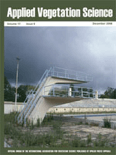
APPLIED VEGETATION SCIENCE
Fostering knowledge for effective environmental stewardship.Applied Vegetation Science is an esteemed journal published by Wiley, dedicated to advancing the field of vegetation science. With a focus on ecology and nature conservation, this journal serves as a vital resource for researchers, professionals, and policy-makers alike. It holds an impressive Q1 ranking in Ecology and Nature and Landscape Conservation, and a Q2 ranking in Management, Monitoring, Policy and Law, positioning it among the top quartiles of its field as of 2023. The journal, with its ISSN 1402-2001 and E-ISSN 1654-109X, encompasses research spanning from its inception in 1998 to 2024, making it a rich resource for trends and developments in vegetation studies. While it is not currently an open-access publication, Applied Vegetation Science continues to uphold rigorous scientific standards and provides critical insights into managing and preserving ecosystems. Its impactful contributions are reflected in its strong Scopus rankings, solidifying its reputation as a cornerstone publication for the study and management of vegetation.
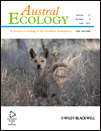
AUSTRAL ECOLOGY
Unveiling the future of ecology through rigorous research.AUSTRAL ECOLOGY, published by WILEY, is a key journal in the field of ecology, with a focus on ecological research from the Southern Hemisphere and beyond. With an ISSN of 1442-9985 and an E-ISSN of 1442-9993, this journal serves as a vital platform for the dissemination of significant findings related to ecology, evolution, behavior, and systematics. Currently holding a commendable Q2 ranking in both Ecology and Ecology, Evolution, Behavior and Systematics categories as of 2023, AUSTRAL ECOLOGY is recognized for its rigorous peer-review process and impactful research contributions, as evident from its Scopus rankings in the 56th percentile for both Agricultural & Biological Sciences and Environmental Science. Researchers, professionals, and students engaged in ecological studies can benefit from the journal's open access options, enabling wider accessibility to critical ecological insights and advancements in the field. Established in 1981, with an evolving legacy through its converged years from 1996 to 2024, AUSTRAL ECOLOGY remains committed to advancing ecological knowledge and fostering a deeper understanding of ecological dynamics in our ever-changing environment.

Folia Oecologica
Advancing Ecological Knowledge for a Sustainable Future.Folia Oecologica is a distinguished open-access journal published by WALTER DE GRUYTER GMBH, focusing on critical research in the fields of agricultural and biological sciences, ecology, and forestry. Established as a vital platform for the dissemination of knowledge, this journal has been providing free access to its valuable content since 2017, catering to an international audience engaged in environmental and ecological studies. With its ISSN 1336-5266 and E-ISSN 1338-7014, Folia Oecologica has earned notable ranks in Scopus, placing it in the 62nd percentile for Agricultural and Biological Sciences and the 50th percentile for Environmental Science. The journal's commitment to high-quality research is reflected in its positions in the Q2 and Q3 quartiles across various categories in 2023. As it converges years from 2006 to 2024, Folia Oecologica continues to foster scholarly dialogue and collaboration among researchers, professionals, and students, making significant contributions to the understanding and preservation of our ecological systems.
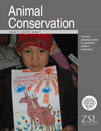
ANIMAL CONSERVATION
Advancing Knowledge to Safeguard Our Planet's Biodiversity.Animal Conservation is a prestigious journal that serves as a vital platform for the dissemination of research dedicated to the preservation of wildlife and habitats. Published by Wiley, this journal has established a significant presence in the fields of Ecology and Nature and Landscape Conservation, holding a distinguished Q1 category ranking for both in 2023. With an impressive Scopus rank of #25 in the realm of environmental science, it caters to a global audience keen on understanding and addressing pressing conservation issues. The journal provides researchers, professionals, and students with high-quality, peer-reviewed articles that explore innovative methods and strategies in animal conservation. With its continuous publication since 1998, encompassing a comprehensive range of topics, Animal Conservation is indispensable for anyone aiming to make impactful contributions to the field of ecology and conservation biology.

NEW ZEALAND JOURNAL OF ECOLOGY
Unveiling the Dynamics of New Zealand's EcosystemsNEW ZEALAND JOURNAL OF ECOLOGY, published by the New Zealand Ecological Society, stands as a premier platform for disseminating research in the field of ecology, with a notable impact factor reflected in its Q2 ranking in multiple ecology categories for 2023. Established in 1980 and actively publishing since 1982, this journal provides a vital resource for ecologists and environmental scientists, fostering the exchange of innovative ideas and methodologies. The journal covers a wide range of ecological topics, ensuring a comprehensive overview of the current trends and research developments in both ecological theory and practical applications specific to New Zealand and beyond. Researchers, professionals, and students will find in this journal an authoritative source to advance their understanding of ecological dynamics and contribute to the growing field of ecological science. The journal is accessible to the community without open access, providing critical insights that underpin the ecological landscape of New Zealand and inform sustainable practices worldwide.
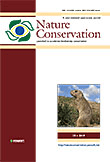
Nature Conservation-Bulgaria
Empowering research to protect Bulgaria's natural heritage.Nature Conservation-Bulgaria is a distinguished peer-reviewed journal published by PENSOFT PUBLISHERS, dedicated to advancing the field of conservation through a comprehensive exploration of ecological and environmental issues. Since its inception in 2012, this Open Access journal has cemented its position as an essential resource for researchers, professionals, and students interested in the complex dynamics of ecosystems and biodiversity conservation. With an impressive Q2 ranking in both the Ecology, Evolution, Behavior and Systematics and Nature and Landscape Conservation categories, the journal showcases significant contributions to ecological scholarship, reflecting its commitment to vibrant and impactful research. The journal's coverage extends from 2012 to 2024, and it is indexed in Scopus, where it ranks in the 63rd percentile for key areas within Agricultural and Biological Sciences. With its base in Bulgaria, the journal also aims to highlight regional conservation efforts while maintaining global relevance, making it an indispensable platform for disseminating vital knowledge and fostering collaboration across the scientific community.